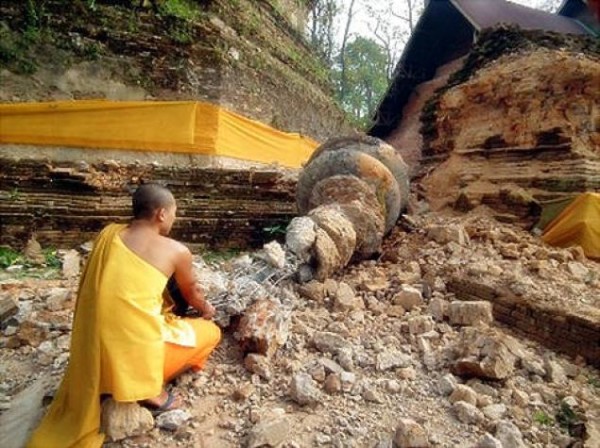With tears running down his cheeks, a Buddhist fisherman from Myanmar told how he was living in fear after his friends were beaten to death by Muslim Rohingya in a brutal attack at an Indonesian detention centre.
“There were too few guards and they just couldn’t get into the block” when violence erupted last week, a clearly traumatised Soe Paing said at the overcrowded, two-storey building on Sumatra island.
“It took ages for the immigration officials to send any backup. That’s why our people died.”
“We are very upset, and now we fear for our lives,” said the slight 44-year-old, one of 11 Myanmar Buddhist fishermen who was in the centre when fighting flared, eight of whom were killed.
The attack underscored the soaring Buddhist-Muslim tensions which have cast a shadow over political reforms in Myanmar, where the end of decades of authoritarian military rule has laid bare deep sectarian fault lines.
It followed an outbreak of deadly communal unrest in central Myanmar last month, the worst since violence between Buddhists and Rohingya in the western state of Rakhine last year that left scores dead and tens of thousands – mainly Muslims – displaced.
Some 200 asylum seekers, from countries including Sri Lanka and Afghanistan as well as Myanmar, remain at the detention centre in the port town of Belawan, with some rooms holding large groups. They have been badly shaken by the killings.
“We could see what was happening through the bars. They were killed right in front of our eyes,” said Mustafa Javeed, a 17-year-old Afghan from the Hazara Shiite Muslim minority.
Friday’s violence began when already high tensions escalated after allegations emerged that some of the Buddhists raped two Rohingya women at the centre and sexually harassed a third, according to the national police.
Around 60 of the Rohingya sealed off the entrance to their block with chairs and tables before launching the deadly attack using pieces of wood and broom handles in the early hours, according to detention centre officials.
Only one immigration officer was on duty at the time in the centre which was holding more than 300 detainees – way above its capacity of 120, the police said in a statement released after their initial probe.
When backup arrived and officials finally got into the room, they found a horrific scene of bloodied, beaten bodies, with blood collected in pools on the floor and smeared on the walls.
Another 15 people, believed to be Rohingya, were also injured in the violence.
Soe Paing and two other fishermen – who had been detained for fishing illegally in Indonesian waters – were unharmed as they were in another part of the centre when the violence broke out.
Detention centre officials and local police originally said they believed the violence was triggered by photos of communal violence in Myanmar, but police and officials say their probe is now focused on the sex attack claims.
At the centre, some of the Rohingya – who have been fleeing the violence in Myanmar in their thousands and are described by the UN as one of the most persecuted minorities in the world – sought to distance themselves from the fighting.
“I’d never faced trouble like this in the past. I never wanted to get involved,” said Ikhbramad, a 41-year-old who gave only one name, adding he was in the room during the attack but did not participate.
Soe Paing, who spoke to AFP earlier this week, and the two other Myanmar Buddhist fishermen who were not involved in the attack, have now been sent to Jakarta to be deported back to Myanmar.
But for asylum seekers still at the centre, who are often detained for months waiting for their cases to be assessed, the violence has made desperate existences even more miserable.
Scores of Sri Lankans have gone on a hunger strike and are demanding to be moved from the gloomy, concrete building to a safer place.
“We’re scared that the same thing will happen to us, so we don’t want to live here anymore,” said R Thusanthan, 29.
Centre official Rida Agustian said that some women, children and couples had been moved since Friday to community housing in the nearby city of Medan in an attempt to ease the pressure on the complex.
“There are not usually tensions like this here, but the overcrowding doesn’t help,” he conceded.






Leave a reply